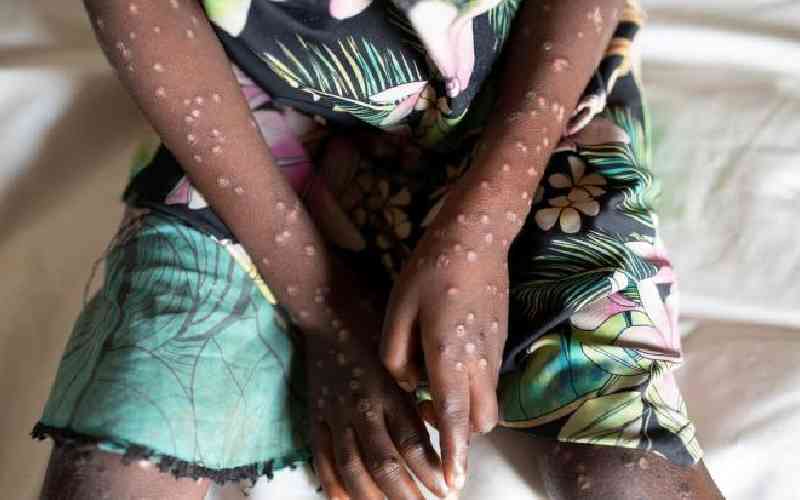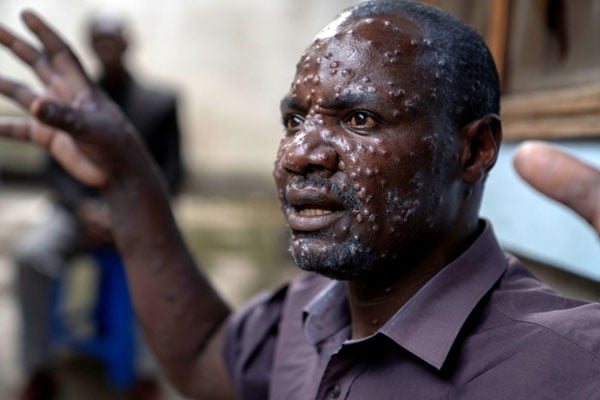By Mercy Kachenge
Nairobi, Kenya: In light of the increasing cases of Mpox, the World Health Organization (WHO) urges immediate action. Collaborative efforts with health authorities are crucial to curb the disease’s escalation in Nairobi, Kenya.
Dr. Henry Kyobe Bosa, of the Ugandan Ministry of Health, discussed the developing global situation regarding Mpox. He commended Dr. Tedros Adhanom Ghebreyesus, the WHO Director General, for convening the Emergency Committee of the International Health Regulations. The purpose of this committee is to provide advice on whether to declare a Public Health Emergency of International Concern (PHEIC).
During a Webinar hosted by the WHO, it was revealed that Mpox, previously known as monkeypox, is not a new disease. It has been observed for over six decades and recently gained prominence in 2022 due to a sudden increase in cases. While the disease can be mild and self-limiting in individuals with healthy immune systems, it can be severe and potentially life-threatening in immunocompromised individuals. Mpox typically has a short incubation period of up to two weeks.
‘”There are two vaccines for Mpox but the stocks are really limited globally therefore calls for individuals to seek early disease detection with those at high risk especially pregnant mothers, the HIV individuals and those whose viral diseases are not well suppressed to take extra caution,’’ said Dr. Kyobe.
 Dr. Kyobe highlighted the alarming difference between the new mpox clade 1b and clade 2, which caused a worldwide outbreak in 2022.
Dr. Kyobe highlighted the alarming difference between the new mpox clade 1b and clade 2, which caused a worldwide outbreak in 2022.
“Clade 1b is driving a severe outbreak in the Democratic Republic of Congo (DRC), where it is currently contained. However, scientists emphasize the urgent need for containment measures due to its potential for a global pandemic. Notably, this variant exhibits increased transmissibility through intimate physical contact during sexual activities, as well as general household contact” said Dr. Kyobe.
According to WHO, people can contaminate Mpox from contaminated objects such as linens or clothing ,through sharp injuries in health care or in community settings such as tattoo parlors. The goal of treating Mpox is to take care of the rash ,managing the pain in order to prevent complications.
He noted that there are principally two clades, Clade 1 in DRC and Clade 2 in West Africa and the current transmission is driven by Clade 1 (Clade 1b) which is more virulent and associated with poor clinical outcomes. Currently the Clade 1b is predominantly in DRC associated with poor clinical outcomes in children and specifically in Immunocompromised individuals.
Additionally, the symptoms present in individuals include pastures which are small balls on the skin, very high clade fever, and resolution within 2 weeks that leave scars. Immunocompromised individuals have extensive skin damage and tissue loss.
According to Dr. Michel Muteba, Epidemiologist Lead for Disease Surveillance in the African Region, the World Health Organization has received reports of Mpox cases from 116 member states across all six WHO regions since January 2022. As of June 2024, a total of 99,176 laboratory-confirmed cases and 535 probable cases, including fatalities, have been recorded.
“There are 5 new countries that are Burundi, Uganda, Côte d’Ivoire, Rwanda and Kenya that have reported cases of Mpox thus expanding the total number of countries to 15 in the African Region. The current Mpox in DRC is caused by Clade 1b which has been confirmed in Kenya, Rwanda and Uganda,” said Dr. Muteba.
WHO recommends that people such as health workers at risk of exposure, men who have sex with men and sex workers are at high risk of getting Mpox to get vaccinated in order to prevent infection with Mpox during an outbreak.
According to Elsa Mariam Karam a Social Listening Analyst based with WHO, Africa Pandemic Response Alliance, raised concerns around specific Interventions, Public Health and Social Measures (PHSM) that may be implemented in response to Mpox in Kenya is about potential lockdown.
The global response that is, WHO Member states and partners to the Mpox outbreak, has coordinated efforts such as to strengthen surveillance and response to ensure early outbreak detection and control regardless of the origin, health authorities to continue collaborating with national and global partners to develop strategies to increase access to diagnostics and improve clinical care and access to vaccines.
This will ensure stigma free risk communication will bolster global preparedness and response efforts to effectively contain Mpox both locally and globally.
According to Dr. Tedros Adhanom Ghebreyesus, WHO Director General, has triggered the process towards Emergency Use Listing for Mpox vaccines and the funds are being released from the WHO Contingency Fund for Emergencies (CFE) to scale up the response in the African Region.
The WHO Strategic Framework for enhancing prevention and control of Mpox urges the need to continue adapting classic public health interventions to the local context for groups at risk and in line with the local modes of transmission.
To enhance the capacity to integrate response efforts with existing interventions, ongoing partnerships with the National HIV/AIDS control programs, humanitarian actors, and immunization teams are crucial. This collaboration aims to reach at-risk populations and prepare for the introduction of the Mpox vaccine, ensuring effective outbreak prevention and response.














